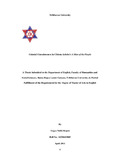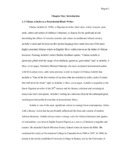Please use this identifier to cite or link to this item:
https://elibrary.tucl.edu.np/handle/123456789/2901| Title: | Colonial Consciousness in Chinua Achebe’s A Man of the People |
| Authors: | Regmi, Yagya Nidhi |
| Keywords: | Chinua Achebe;A Man of the People;Novel;English literature;Nigerian writer |
| Issue Date: | Apr-2011 |
| Publisher: | Central Department of English Kirtipur, Kathmandu |
| Level: | Masters |
| Abstract: | Chinua Achebe (b. 1930) is a widely popular postcolonial Nigerian writer. In his works, major focus is given to African politics, culture and the effect of colonization in African societies. He has set this novel, A Man of the People in the postcolonial period in an independent African country. In the novel Achebe has obviously drawn the picture of post-colonial Africa and African countries. The novel tells the story of the young educated and conscious people Odili, the narrator of the novel, and his conflict with Chief Nanga, his former teacher who enters a career in politics in an unnamed modern African country. Odili represents the changing younger generation as well as colonized African people whereas Nanga represents the traditional custom of Nigerians as well as the colonizer. Through the relationship between Odili and Nanga, Achebe attempts to depict the colonial influence in Post-Independent African countries. Nanga is the powerful but corrupt Minister of Culture. As the Minister of Culture, Nanga's job is to protect the traditions of his country. However, he uses his position and power to increase his personal wealth rather than to improve the culture of the country. Being a representative of indigenous, marginalized, oppressive and exploited group of people, Odili struggles for power, rights, and equal opportunities and then to overthrow the government run by Nanga-like politicians, who is the representative of colonizer. So there is a clash between Odili and Nanga for the sake of power; one wants it for the continuation of corruption while other for social welfare and end of such corruption. Achebe makes a great satire upon the so-called politicians of the nation who earn wealth from bribery, corruption and suppression. Postcolonial |
| URI: | http://elibrary.tucl.edu.np/handle/123456789/2901 |
| Appears in Collections: | English |
Files in This Item:
| File | Description | Size | Format | |
|---|---|---|---|---|
| cover page.pdf | 213.81 kB | Adobe PDF |  View/Open | |
| Thesis.pdf | 460.59 kB | Adobe PDF |  View/Open |
Items in DSpace are protected by copyright, with all rights reserved, unless otherwise indicated.
